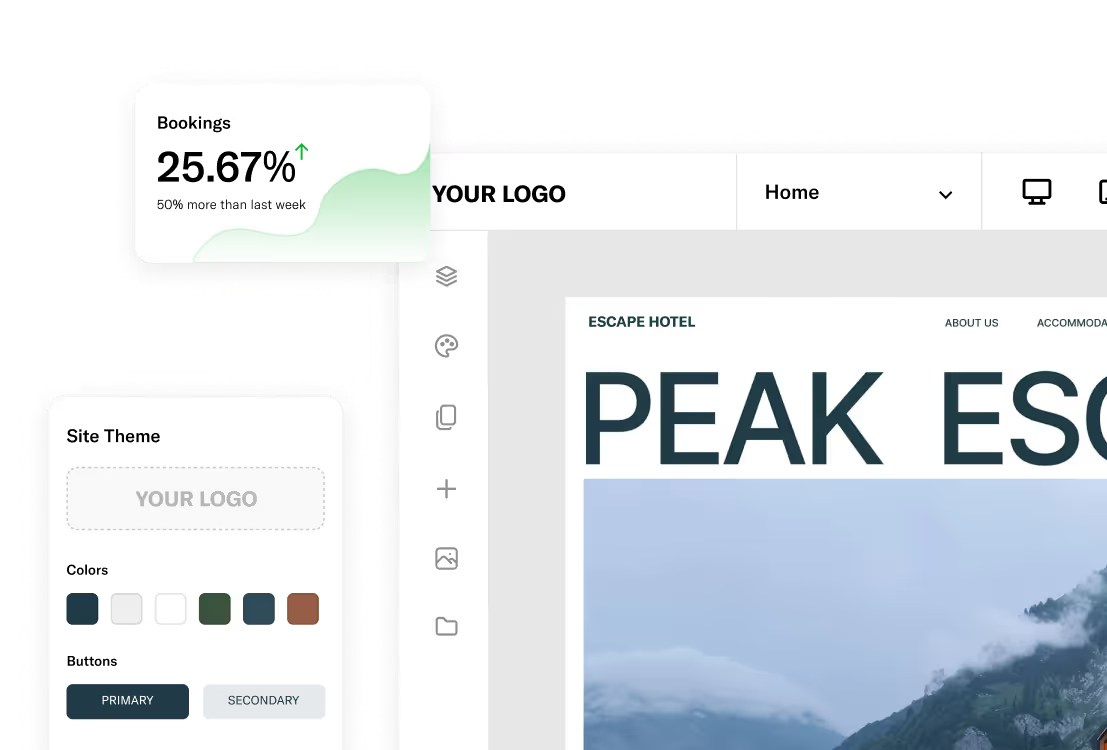Table of Contents
Join Thousands of Hotels Thriving with roommaster
The transition to roommaster is straightforward and efficient. Our implementation team handles data migration including reservations, guest profiles, and historical information.
Imagine a traveler planning their next trip, searching online for accommodations that fit their needs and preferences. The hotels that appear at the top of the search results are obviously the ones that will catch their attention first. If your property isn’t among them, you could be missing out on valuable bookings. This is where Hotel Search Engine Optimization (SEO) comes into play. Hotel SEO isn’t just about improving rankings—it’s also about making your hotel easily discoverable, creating engaging content that resonates with travelers, and encouraging direct bookings through a user-friendly website too. In this guide, we’ll dive into actionable strategies to help your hotel rise to the top of search results and capture the attention of potential guests.
Hotel SEO isn’t just about ranking higher in Google—it’s about connecting with your audience in meaningful ways. For hotels, this means:
Research shows that 75% of travelers never scroll past the first page of search results, making a strong SEO strategy hence, vital for your success.
Local Hotel SEO ensures your property is visible to travelers searching for accommodations in your area. So, to optimize for local search, follow these tips:
High-quality content is the backbone of effective Hotel SEO. Focus on creating content that provides value to your audience. Examples include:
With a majority of hotel searches now occurring on mobile devices, having a mobile-friendly website is essential. Ensure your website:
{{booking-engine-one}}
Schema markup helps search engines understand your content better, and this of course can enhance how your site appears in search results. Use hotel-specific schema to display:
This can lead to richer search results and of course, to more clicks.
While implementing SEO strategies, avoid these common pitfalls:
To ensure your Hotel SEO efforts are driving the desired results, monitoring performance metrics is crucial. These insights will help you refine your strategy and of course, achieve better outcomes over time.
Monitor how many visitors arrive at your website through organic search, because an increase in organic traffic indicates that your keywords and content strategy are effectively capturing search interest.
Track the rankings of your targeted keywords, especially location-specific terms like "luxury hotels in [city]." Later, regularly assess which terms are driving traffic and adjust your content to target high-performing keywords.
A high bounce rate suggests that visitors leave your website shortly after arriving, often because they couldn’t find what they were looking for. Optimize your website’s layout and also ensure your content is clear and engaging to reduce this rate.
{{hotel-website-builder}}
Ultimately, the goal of SEO is to convert visitors into guests. Measure how many bookings or inquiries come from organic traffic. Make sure your booking engine is also seamlessly integrated and mobile-friendly to encourage conversions.
Google prioritizes websites that load quickly, particularly on mobile devices. Use tools like Google PageSpeed Insights to identify and resolve issues that might be slowing down your site.
The number and quality of backlinks to your site are key indicators of its authority. Develop partnerships with local attractions, blogs, and also tourism boards to build a robust backlink profile that enhances your search engine credibility.
SEO is not a one-and-done effort; it requires ongoing optimization and adjustments. Here are some tips for continuously improving your Hotel SEO:
By actively tracking these metrics and refining your strategy, you can ensure your hotel remains competitive in search engine rankings, thus, attracting more guests and boosting direct bookings.
Effective Hotel SEO requires the right tools to analyze and then refine your strategy. Tools like Google Analytics, SEMrush, and also Moz can provide insights into your traffic, keyword rankings, and competitors. For hotels, leveraging tools that focus on local SEO can be particularly beneficial.
A boutique hotel implemented local SEO strategies, optimized their Google My Business profile, and then, started a travel blog focused on their area’s attractions. Within six months, they saw:
Hotel SEO refers to the process of optimizing a hotel's online presence, thus, ranking higher in search engine results. It is vital for increasing visibility, driving direct bookings, and finally, for reducing reliance on OTAs.
Local SEO makes your hotel more visible to travelers searching for accommodations in your specific area. It also involves optimizing Google My Business profiles, using location-specific keywords, and finally ensuring NAP consistency across directories.
Focus on metrics like organic traffic, keyword rankings, conversion rates, and also page load speed to evaluate the performance of your SEO strategy.
Develop blogs about local attractions, use FAQs to answer traveler questions, and finally, include professional visuals of your property and amenities. Tailor your content to address your target audience’s interests.
roommaster Hotel Website Builder ensures your site is mobile-optimized, customizable, and also SEO-friendly. It integrates seamlessly with booking engines and property management systems to provide a streamlined user experience.
{{cta-strip}}


The transition to roommaster is straightforward and efficient. Our implementation team handles data migration including reservations, guest profiles, and historical information.
See how roommaster's unified platform can work for your property. Our team will walk you through features tailored to your specific needs and operations.